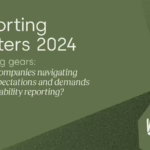New Ernst & Young LLP and Boston College survey of sustainability experts examines the benefits of the GRI Sustainability Reporting Framework and the risks of not reporting
In todays competitive business environment, sustainability reporting is evolving into a core business practice for companies around the world because they say it provides a competitive advantage. Though issuing a sustainability report in accordance with the GRI Framework (GRI) or another standard requires a lot of work, there is strong evidence that transparency offers a number of financial and social advantages that make it more than worth its costs. A new report from the Boston College Center for Corporate Citizenship and Ernst & Young LLP (Boston College / Ernst & Young LLP) Value of Sustainability Reporting offers insights on the benefits of sustainability reporting, assuring sustainability reports and the risks of not reporting.
Why report?
Companies have a variety of motivations that change based on company size, industry and ultimate goals of the sustainability report. With that said, the top four motivations for reporting for all companies that were both public and private included in the Boston College / Ernst & Young LLP survey sample were:
Transparency
Competitive advantage
Risk management
Stakeholder pressure
Reporting has its benefits. New research suggests that the value of disclosure also extends to the firms balance sheet, with the most transparent companies in some studies tending to have higher cash flows. The Boston College / Ernst & Young LLP survey participants agreed. In fact, over half of the respondents reported realizing business value as a result of their companies reporting efforts.
How are companies reporting and assuring their reports?
While there are many ways a company can report its sustainability performance, with more than two-thirds of survey respondents saying their organization employs the GRI or a GRI-referenced framework in the preparation of their report, its clear that GRI currently provides the global standard for comparability.
Moreover, with analysts, investors and other stakeholders paying attention to sustainability reporting, many companies are increasingly assuring their sustainability reports. Among those report-issuing companies in the Boston College / Ernst & Young LLP survey, 35% have some level of assurance conducted on their sustainability reports. Of those reporting assurance, 55% have their full reports assured and 45% have some indicators assured.
Though assurance is not yet mandatory for sustainability reports, it is an important risk management exercise, particularly as there is eventually likely to be an increased demand for comparability and alignment across reports.
Why dont companies report?
Survey respondents disclosed three primary challenges to sustainability reporting and the assurance process:
Availability of data
Accuracy or completeness of data
Internal buy-in
Additionally, for large enterprises, sustainability may not be an entirely internal activity. Some organizations need to work with subsidiaries and suppliers, some of whom either may not be large enough to support robust reporting or may not yet have adopted the practice of sustainability reporting.
We were excited to see the high number of survey participants 50% that indicated sustainability reporting gave them a competitive advantage, said Brendan LeBlanc, Executive Director, Climate Change and Sustainability Services, for the global Ernst & Young organization. This statistic is evidence that sustainability practices ought to, at a minimum, inform corporate strategy theres too much at stake.
Most large global corporations see sustainability reporting as a routine business discipline, said Katherine Smith, Executive Director, Boston College Center for Corporate Citizenship. We see increasing interest among corporations and investors in sustainability reporting both as a way to ensure that environmental and social impacts are managed and as a way to assess the quality and commitment of management. Assured reports earn more credibility.
In spring 2013, the Boston College Center for Corporate Citizenship and Ernst & Young LLP conducted a survey on sustainability reporting, which was administered February 26 March 8, 2013. Participants were members the Boston College Center for Corporate Citizenship, members of a Survey Sampling International (SSI) panel who were corporate professionals required to hold a manager or higher position within their company and be familiar with their organizations disclosures and to other professionals. The comprehensive survey covered various aspects of an organizations ESG reporting. Topics included the cost and benefits of reporting, as well as making connections to financial performance. Respondents companies did not have to report in order to participate in the survey.



